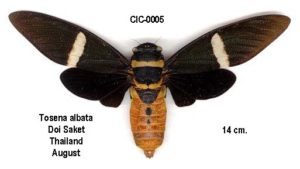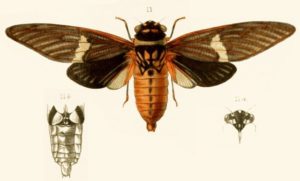Tosena is a genus of cicadas that can be found in the Indo-Malaya ecozone, which includes the Indian subcontinent, Southeastern Asia and southern China. Tosena cicadas have colorful wings, which rival the beauty of butterfly wings. Tosena are easily obtainable online from stores that sell insects, or ebay. The Tosena genus was first identified by Charles Jean-Baptiste Amyot & Jean Guillaume Audinet-Serville in 1843.
From A Monograph of Oriental Cicadidae by W. L. Distant:
Tosena is one of the most conspicuous genera of the Cicadidae, and its species are all included in this fauna. The north-eastern districts of Continental India are its head-quarters, for here are focused some of the largest and handsomest of its species ; it is also well represented in Burma, and from thence its distribution is extended throughout the Malay Peninsula to the south, and apparently northward as far as some portions of China. In the Malayan Archipelago it is not uncommon in Sumatra, Java, and Borneo, and as I have seen representatives from Amboyna, it probably exists in other intervening islands, of which, however, we have at present no precise information.
Different types of Tosena:
Tosena albata:

Photo by Michel Chantraine.
Distinguishing features: Mustard colored pronotal collar, orange abdomen with a series of two black circular spots, and dark brown wings with one white stripe on each fore wing.
Habitat: Southeast Asia.
Tosena depicta:

Illustration from A Monograph of Oriental Cicadidae by W. L. Distant.
Distinguishing features: A vibrant green pronotal collar; an orange abdomen with a series of black markings; wings are dark brown to black, with the one white stripe on each fore wing, and a white anal lobe on each hind wing.
Phantastic songs of the S.E. Asian cicadas! website has an MP3 of a T. depicta singing.
Habitat: Southeast Asia.
Tosena fasciata

Tosena fasciata by Ãlvaro Lisón Gómez Creative Commons License.
Distinguishing features: A pale orange pronotal collar; brown wings with one white stripe on each fore wing; an orange abdomen with one black spot; the the anal lobe of the hind wing appears lighter in color than the rest of the hind wing.
Habitat: Southeast Asia.
Tosena mearesiana
No photos.
Distinguishing features: See A Monograph of Oriental Cicadidae by W. L. Distant
Habitat: India.
Tosena melanoptera
Photos of a live T. melanoptera.
Distinguishing features: Red eyes; white pronotal collar; pale brown stripe on dark brown fore wings.
Habitat: India & Southeast Asia.
Tosena monitvaga
No photos.
Distinguishing features: See A Monograph of Oriental Cicadidae by W. L. Distant
Habitat: India.
Sources to learn more about Tosena cicadas:
- The Book Cicadas of Thailand: General and Particular Characteristics. Volume 1 by Michel Boulard. This book mentions Tosena, in particular, many times, and in general it does an excellent job of discussing the anatomy, behavior and habitat of cicadas found in Thailand.
- A Monograph of Oriental Cicadidae by W. L. Distant. (1889, Published by the Order of the Trustees of the Indian Museum of Calcutta).
- Rhynchota: Heteroptera-Homopetera ( Fauna of British India, including Ceylon and Burma ) by W. L. Distant (1906)
- The Cicadas of India Facebook page
2 replies on “Tosena Cicadas”
I have a collection of se Asian insects in a sealed shadow box a wanted input on ceasing them in clear resin worried that they may break down if left in the shadow box. Please advise
I keep mine pinned in cedar boxes, with a little naphthalene (moth balls) to keep the dermestid beetles from consuming them.
I think it would be possible to preserve them in resin but you might have to experiment with different types of resin to get it right. Cicada bodies are mostly hollow, so after you pour the resin, air bubbles will release and the abdomen may collapse. Maybe fill the abdomen first. Maybe a vacuum chamber would help removing the air. You might have to experiment to find a resin that doesn’t change their colors.